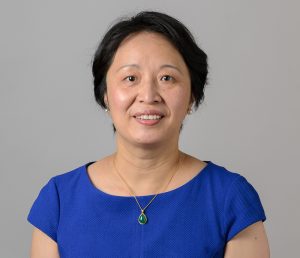
Dr. Mei Wei, assistant professor of Materials Science & Engineering, who joined the University of Connecticut in 2002, was recently awarded three important research grants to examine biomaterials. The grants-totaling nearly $700,000 and awarded by the National Science Foundation and Connecticut Innovations, under the Yankee Ingenuity Technology Competition-will support Dr. Wei’s research in the areas of bone repair and orthopaedic and dental implants.
Dr. Wei’s research expertise lies in biomaterials and related areas, research subjects that captured her interest during her graduate education. Dr. Wei earned her master’s and Ph.D. degrees in the School of Material Sciences and Engineering and the Graduate School of Biomedical Engineering, University of New South Wales, Australia in 1994 and 1998, respectively. After earning her doctoral degree, Dr. Wei accepted a fellowship funded by the Japan Society for the Promotion of Science and joined one of the world’s leading biomaterial research groups at Kyoto University, Japan. She returned to Australia in 1999 to pursue another research fellow position with Queensland University of Technology before joining the University of Connecticut.
Until recently, engineers have relied upon materials such as metal and ceramic tooth fillings, artificial joints and cardiovascular implants to repair damage to the human body from a range of ills, from dental caries to broken or shattered bones and devastating heart disease. As marvelous as this first generation of biomaterials has been for the advancement of human health, such foreign materials suffer from numerous drawbacks such as wear and failure, unexpected interactions with existing biosystems, and the need for replacement. Dr. Wei and other biomaterials researchers are exploring new types of materials that comprise hydroxyapatite as a central component for use in bone repair and prostheses.
Hydroxyapatite is an inorganic compound found in the human body that is the chief structural component of bone and teeth, providing rigidity. In her work, Dr. Wei seeks to demonstrate that a composite of hydroxyapatite and polymer materials offers greater bone/implant interface stability, longevity and biocompatibility than first-generation biomaterials, and her recently funded research will seek to explore this theory as well as the success of integrating drug delivery qualities and bone healing factors into the hydroxyapatite composite materials.
In research funded by Connecticut Innovations, Dr. Wei is collaborating with professor Montgomery Shaw of Chemical Engineering to explore the performance of a new synthetic composite material, woven from apatite and polymer fiber, in promoting bone repair, spinal fusion and other skeletal healing. According to Dr. Wei, 1.3 million bone repair procedures are performed in the U.S. yearly. Among these, the most difficult are those involving compound fractures, trauma, bone tumors, congenital defects and spinal fusion. It is her belief that a hydroxyapatite/polymer material will enhance structural integrity as bones repair, can be designed to deliver bone-regenerating drugs, and can be slowly biodegraded in the human body-thereby eliminating the need for replacement or followup surgery to remove the materials. Another study, funded by the National Science Foundation (NSF), involves another apatite/polymer composite in load-bearing skeletal implantations.
The third study, also funded by NSF with collaborator Dr. Sudipta Seal of the University of Central Florida, examines ways to improve the biocompatibility, stability and long-term performance of titanium-based orthopaedic and dental implants by application of a hydroxyapatite coating to the surface prior to implantation. Drs. Wei and Seal foresee the possibilities of applications in micro-electro-mechanical systems and nano-electro-mechanical systems such as sensors and actuators.
Dr. Wei explains that “The goal of our research is to explore a new generation of biomaterials, which have excellent biocompatibility, sufficient mechanical strength, good osteoconductivity and osteoinductivity, suitable for dental and orthopedic applications. The winning of the three grants will certainly give us a good start in pursuing our goals. As people’s life expectancy is getting longer, there will be a demand for a significant increase in the survival rate of the implants. It is expected that the research in biomaterials will be greatly expanded.”



